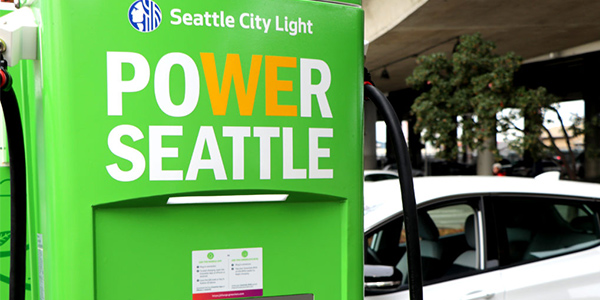Two bills intended to help decarbonize Washington’s transportation sector are headed to the governor’s desk for signature after passing both houses in the legislature.
House Speaker Laurie Jenkins (D) signed the bills Tuesday before sending them to Gov. Jay Inslee, who is expected to approve both.
The first, HB 1287, requires the Department of Transportation to set up a system by 2023 to predict the growth of electric vehicles, where that growth might occur and the number and location of charging stations that would be needed.
The legislation calls on electric utilities to use those predictions to map out where charging stations should be installed in their service territories. Mapping efforts will include airports and ferry sites.
The bill also orders the Building Code Council to improve the standards that it set for charging stations in 2019.
After modifying the bill, the Democrat-controlled Senate passed it 25-23 on April 10 with a couple Democrats opposing it. Mostly along party lines, the Democrat-dominated House approved the bill 54-43 with the Senate’s modifications on April 14.
The Senate added two amendments. One was for construction firms to prewire new buildings for electric car chargers before drywall is installed. The other is to set “a goal” of having all new cars sold in the state be EVs starting in 2030.
Ahead of the House vote, Rep, Andrew Barkis (R) voiced his caucus’ objections to the bill, criticizing the EV sales “goal.”
“We’ve seen time and time again that goals become policy,” he said. “Having a certain amount of vehicles to be EV by a certain time is a huge piece added to this legislation.”
Barkis also said adding charging stations to building codes is an unnecessary step.
The bill’s sponsor, Rep. Alex Ramel (D) said the state needs to prepare for the increasing use of EVs. “This is about a growing trend in electric vehicles. What is going to be done about providing electricity and electrical infrastructure? This is designed to be about that challenge.”
Tax Break for FCEVs
The other bill by Sen. Brad Hawkins (R) sets up an eight-year pilot program in which the 6.8% sales tax on cars will be cut in half for the first 650 hydrogen fuel cell electric vehicles (FCEVs) sold in the state. Current prices for the cars range from $34,000 to $58,000, according to manufacturers’ figures. After eight years, the exemption would be reevaluated. Exemptions would apply only to new vehicles.
Hydrogen fuel-cell cars are not a common sight in the state. A Kenworth manufacturing plant in the Seattle suburb of Renton has built a handful of fuel-cell semi-trucks earmarked for use in California with hydrogen cells from Toyota Mirai cars.
The House passed the bill 93-4 on April 10 without any modifications from the bill that passed the Senate 49-0 on March 3.
“Can we love this bill to death?” Rep Robert Sutherland (R) said at the April 10 House vote.
Rep. Ed Orcutt (R) said: “This is another technology that helps us reduce CO2 going into the atmosphere,” adding that swapping hydrogen fuel cells is much faster and more convenient than charging EVs
“This is an opportunity to bring tax parity to another alternative fuel,” Rep. April Berg (D) said.
The production of hydrogen is carbon-free when the fuel is sourced from water and the process is powered by emissions-free resources. Exhaust from a hydrogen FCEV is a trickle of water from the tailpipe and a wisp of steam.
Hawkins represents a district in central Washington crossed by the Columbia River, which supports an extensive network of hydroelectric dams. It includes the Douglas County Public Utility District, owner and operator of the 840-MW Wells Dam. The PUD plans to use electricity and water from that dam to supply a proposed plant to create hydrogen from reservoir water. (See Wash. PUD Breaks Ground on Hydrogen Plant.)
Construction of the $20 million hydrogen plant began in March and is scheduled to be finished by November. The plant is expected to produce two tons of hydrogen a day.




